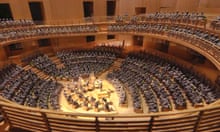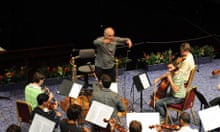Daniel Barenboim, one of the world’s foremost music conductors, is planning to take a Berlin orchestra to Iran for a concert and a possible collaboration with Tehran’s reborn symphony orchestra, despite angry protests from Israel.
A performance by Barenboim, the 72-year-old Israeli-Argentinian, in Iran will be a significant moment in the rapprochement between Iran and the west in the wake of the landmark nuclear deal struck in July. The cultural exchanges with the outside world are expanding with the director of the Louvre museum, Jean-Luc Martinez, going to Tehran in the near future.
It is understood that Barenboim had planned a concert in Tehran early next month but it has now been postponed. It is not clear if objections from Israeli officials – who lobbied the German government against the visit – had anything to do with the change in the original plan. Iranian sources said organisers were looking for a new date.
Under the late Shah, Tehran was a popular cultural hub for western celebrities with its symphony orchestra hosting the likes of violinist Yehudi Menuhin and choreographer Maurice Béjart at its heyday. But after the 1979 Islamic revolution, the orchestra went into a coma and later was fully disbanded under the hardline Mahmoud Ahmadinejad. It was revived in March under the new moderate administration of Hassan Rouhani which hired a world-class conductor to bring it back to life after a three-year hiatus.
Germany, in particular, has been leading a pack of European firms and officials travelling to Tehran for business opportunities, having sent a 100-member delegation led by its vice-chancellor and economy minister to Iran last month.
“The Staatskapelle Berlin with its music director Daniel Barenboim is currently in talks with Iran about a possible concert of the Staatskapelle in Tehran,” said a statement by Staatskapelle Berlin.
“German foreign minister Steinmeier has taken on the patronage of this concert and supports Daniel Barenboim’s commitment to make music accessible to people beyond any national, religious or ethnic boundaries.”
Speaking to the Guardian, the musical director of Tehran’s symphony orchestra and its principal conductor, Ali (Alexander) Rahbari, said he has been aware of Barenboim’s negotiations with the Iranian authorities and welcomed his forthcoming visit.
“This is very important for us,” he said. “We have prepared our own orchestra for a collaboration with them and we are very pleased to be involved.” Rahbari, 66, is internationally known and has conducted more than 120 European orchestras, including the Berlin Philharmonic and London Philharmonic, and has worked with the late Austrian conductor, Herbert von Karajan.
Since earlier this year, the Iranian-born conductor has been on a mission to revive Tehran’s Symphony Orchestra, an institution which has weathered some turbulent events, including a coup, an eight-year war and a revolution, in its 80-year history. In March, the group’s all male 87 musicians and 70 choir singers perfomed a rare Beethoven’s Symphony No 9 at Tehran’s Vahdat hall in front an audience of foreign ambassadors and senior officials.
Barenboim’s forthcoming visit will also be significantbecause of his links to Israel, even though he has been critical of the Israeli government. Iran does not recognise Israel as a legitimate country and its citizens are banned from travelling to the Jewish state. Iranians who travel to Israel risk being jailed for up to five years. But Iran has made exceptions, especially when it involves international figures. Rahbari himself has performed in Israel before returning at the helm of Tehran’s orchestra.
Barenboim records for Decca/Deutsche Grammophon and is a co-founder of the youth West-Eastern Divan Orchestra, which brought Israeli, Palestinian, Egyptian, Iranian, Jordanian and Lebanese musicians together, performing in Ramallah in 2005. The pianist and conductor is a UN messenger of peace and has also taken an honorary citizenship of Palestine.
Israel’s culture minister, Miri Regev, has strongly criticised Barenboim’s efforts to hold a concert in Iran, a country which she said supports terrorism. “This melody must be stopped,” she wrote on her Hebrew Facebook page, according to Haaretz. “Barenboim promotes an anti-Israeli line and makes sure to bash [Israel] by using culture as a lever for his anti-Israel political views. This is an erroneous decision by [Angela] Merkel,” Regev added, referring to unconfirmed reports that German chancellor may join the conductor on the visit to Tehran.
“Iran is a country that supports terror, stands behind Hezbollah, Islamic Jihad and Hamas, and its leaders have blood on their hands. I think it would behoove Germany to cancel the appearance of the orchestra and its conductor. There’s no reason to celebrate; certainly not with an orchestra.”
The Austrian president, Heinz Fischer, is expected to travel to Tehran next month in what will be the first visit to Iran by a European head of state in more than a decade. It comes after several visist to Tehran in recent months by European officials, including the UK foreign secretary, Philip Hammond, who reopened the British embassy in Tehran last week. Germany’s foreign minister, Frank-Walter Steinmeie, is also expected to travel to the Iranian capital in October but it is not clear if Barenboim’s performance will coincide with that.
Rahbari said the reception in Tehran of the orchestra in the past five months has been “phenomenal”, with the group perfoming every single week without interruption in concerts often sold-out. They have performed Beethoven’s Symphony No 9 nine times in this period, more than the number of the times it has been performed in 40 years put together.
Earlier this month, the Iranians and China’s Philharmonic Orchestra held a two night joint concert in Tehran, performing Tchaikovsky No 5. The Iranian group consisted of male musicians in black suits and female counterparts with white scarves. Women’s participation in Rahbari’s band is conspicous. Soloists from other countries, including Russian classical cellist Alexander Rudin, have also performed with the group.
Rahbari said he has written the orchestra’s September to September annual programme in advance. He is bringing back opera to Iran. The Magic Flute, Hansel and Gretel and Puccini’s Gianni Schicchi are set to be performed.







